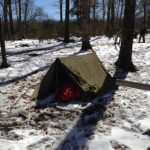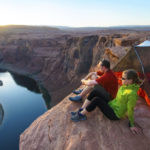Cold Weather Camping for the Novice
A beginner at camping can still be comfortable in a tent on frozen ground by observing a few basic precautions. The most important of these is to stay dry. Even the light moisture of human perspiration will make the clothing seem cold. Hypothermia, the unsafe lowering of body temperature, is a real threat, and it can happen in the most seemingly benign circumstances.
Proper Clothing in Layers
Keeping dry begins with the choice of clothing. Cotton is the enemy of a winter camper. It holds mo isture and is hard to dry out. Wool will offer some warmth even when wet. Polyester sheds moisture and will dry much faster.
isture and is hard to dry out. Wool will offer some warmth even when wet. Polyester sheds moisture and will dry much faster.
Begin by purchasing or borrowing synthetic base layer clothing or long johns. At least two sets of close-fitting leggings and long sleeve crew neck or turtle neck shirts are necessities. Any polyester base layer items will work, but thicker is better if the weather forecasters are predicting temperatures below zero Fahrenheit.
Two sets are necessary, because they must be changed each day and not worn to sleep. Many sufferers have found that changing clothes each morning may be an unpleasant way to start a cold day, but wearing clothes all night and then outside in the day will cause the moisture in the clothing to freeze and swiftly become uncomfortable. Bring sleeping clothes that are loose fitting and warm.
The second layer above the base layer should be wool or synthetic fleece. A fleece hoody makes a great second layer on top. Fleece lined nylon athletic pants make a good second layer on the legs. If a third layer of nylon ski pants or bibs is planned, the second layer might safely be denim jeans, as long as they are tucked up and don’t drag in the snow to become wet.
The third layer must shed water. That means polyester, nylon or a fabric coated in a waterproof substance. Coats should be made with synthetic insulation, or down-filled. If it looks like rain, some sort of poncho or rain gear that will fit over the coat are needed. Nylon snow or ski pants or bibs are the best third layer on the legs.
Head, Hand and Foot Gear
Cover the head. Ninety per cent of heat lost from the body is lost from the head. Take a hat and wear something with a hood. Sleeping gear should include a head covering of some kind. Even in a mummy bag, a hat or hood is a good practice.
In particular, wool socks are an excellent investment. Wool or polyester sock liners and wool socks inside snow boots with some rubber above the sole will keep the feet dry and warm. Nobody likes cold toes. Extra boots are a good plan if they can be borrowed or purchased inexpensively.
Plenty of gloves and mittens are needed, because these will be the most likely to become wet from snow or cooking. A farm store or other store that sells work gear will have a large variety of light weight, insulated gloves that are very reasonably priced.
Other items that might be useful to a novice camper include hand warmers found in most camping and hunting departments. Placed inside gloves or mittens, they can help keep fingers toasty. Be sure to follow the directions to keep from overheating skin. Scarves, face masks and balaclavas are also useful items to protect the face from freezing.
Tent, Sleeping Bags and Pads
Beyond clothing, the choice of tent and sleeping bag are key. Large summer tents with a lot of mesh and head space are not likely to be very comfortable in the snow and cold. A smaller tent with more wall fabric and vents near the top is needed. Tents in cold weather tend to become saturated with moist air from the breath of the sleepers. Vents near the top minimize the condensation of the moisture in the air by allowing it an escape to the outdoors. It seems counter-intuitive, but letting warm air out keeps one warmer overall.
Sleeping bags are available for various temperature ratings. It isn’t necessary to have a forty below zero bag, only layer the sleeping bags as one layers clothing. A forty degree bag inside a twenty degree bag will keep one warm down to zero degrees and combining a wool or fleece blanket with a zero degree bag will keep one warm below zero. Experiment for best results.
Make sure the sleeping bag is not in direct contact with the tent floor. Packing blankets or extra tarps on the floor inside of the tent in addition to a self-inflating mattress pad or foam pad will insulate the sleeper from the cold ground. Always shovel snow away from the site before setting up the tent.
Try to borrow as much as possible to keep the cost down. Grandpa’s old wool army sweater will be very useful. Almost everyone has a sleeping bag or two in the attic or basement that can be borrowed for a weekend. Camping equipment need not cost a bundle to keep one bundled up.
Making Camping Reservations in State and National Parks in the US
Park reservations can be made online, however a staff of qualified agents are a phone call away. These agents take reservations and can assist a customer in making them online. Since holding times for making reservations are long, being prepared to make a reservation saves time.
Some circumstances require making reservations while on the road. When doing so, try to pick a quiet place from which to make the call. Sitting on the beach may be a comfortable place to make the call, but wind noise can make  accuracy difficult to achieve. Further, cell phone reception is often poor when camping and may not last long enough to complete the transaction in which case the process will have to be repeated.
accuracy difficult to achieve. Further, cell phone reception is often poor when camping and may not last long enough to complete the transaction in which case the process will have to be repeated.
Tips to Making Quick and Accurate Camping Reservations by Phone
- Know the actual name of the campground/park.
- Popular names often differ from the actual name.
- Plan the trip and have alternate campground and/or dates in mind.
- Consult maps of the campsite on line to pick the most desirable.
- Prepare all contact Information.
- Interagency Senior and Access Pass, or Golden Age Passport card number.
- A credit card is required.
- Paper and pencil.
- Do not put the reservation agent on hold since the software may cancel the call.
- Make the reservation several months or at least several weeks in advance.
Yosemite Camping Reservations
Obtaining reservations to any of the campgrounds in Yosemite National Park is difficult. If reservations are desired within the coming two months the best solution is to find a cancellation on line. Yosemite campsites go on sale the fifteenth of every month at 10 a.m. Pacific Time.
- All campgrounds sell out very quickly.
- Establish an account online.
- Search and reserve any site in any park.
- Refresh the web browser often.
- Do not get discouraged.
Online Camping Reservations
Making online reservations at a National or State Park is quicker than waiting for an agent on the phone. Although great effort has been made to make the process easy, many find the process confusing. Be sure to verify your choices before placing the order. If you make an error a fee will be charged to correct it when you call an agent to correct the error. The agent does not have the authority to waive a fee.
Either site requires an online account before a reservation can be made. Both sites will show availability, however they default to searching only for sites available for reservation. They will not show the first come first serve sites (designated by “W”) unless the search is adjusted to do so.
Clicking on the “Book Now” tab removes the campsite from available status to allow time to complete the reservation. After providing a credit card number, the screen will show the reservation number and an email confirmation will be sent within 48 hours. If no confirmation/reservation number appears on the screen the transaction has failed. The campsite will be returned to inventory in about a half hour.
Interagency Senior Pass
The Interagency Senior Pass is available to US citizens and permanent residents 62 and older. The pass allows a 50% discount on user fees such as camping, swimming, boating and guided tours.
Interagency Access Pass
Available to US citizens and permanent residents that have been medically determined to have a permanent disability regardless of age. There is no charge for Interagency Access Pass lifetime pass. The pass allows a 50% discount on the same user fees as the Senior Pass.
Increased demand for campsites required a reservation system to fairly allocate sites to everyone. Of the two ways to reserve a site the online option is quicker, however a phone call to the US based agents allow direct conversation and advice from a knowledgeable person.
Recent Posts
- Early Spring Hammock Preparation
- Camping and Hiking at Kopachuck State Park in Gig Harbor, WA
- Cold Weather Camping for the Novice
- Oceanfront Camping at State Parks in California, USA
- Making Camping Reservations in State and National Parks in the US
Categories
- Camping
- Camping Hammock
- Cold Weather
- Glamping
- Hammock
- Hammock Accessories
- Hammock Chair
- Hammock Tree Straps
- National Park
- RV Camping
- Uncategorized


